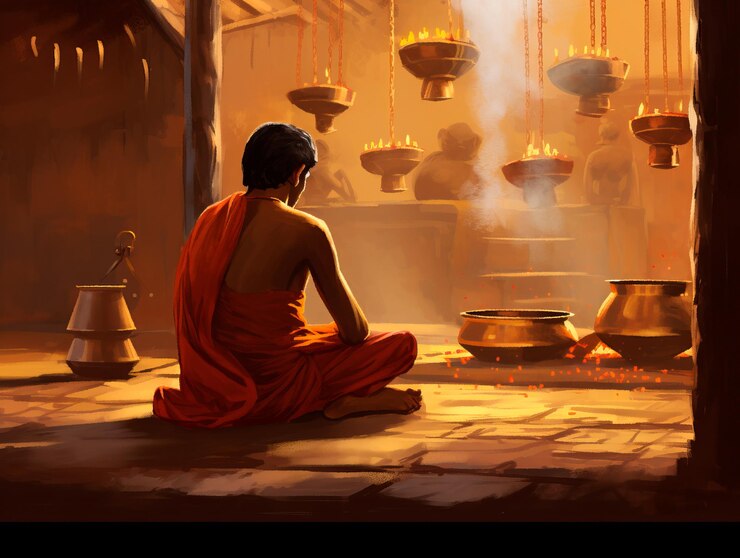
In ancient Indian philosophy and spirituality, Dharma is a guiding beacon for individuals seeking a path to righteous living. Rooted in the rich traditions of Vedic culture, Dharma transcends mere morality and extends into the profound understanding of one’s duty, purpose, and the interconnectedness of all existence. This intricate concept, woven into the fabric of Hindu philosophy, has been a source of moral and ethical guidance for millions over millennia.
What is Dharma?
The term “Dharma” finds its roots in the ancient Sanskrit language, with its literal translation suggesting a principle or law that upholds and sustains the order of the universe. To grasp the essence of Dharma, one must delve into the foundational texts of Hinduism, particularly the Vedas, Upanishads, and the epics of Ramayana and Mahabharata.
Dharma and Its Four Pillars
In Vedic culture, Dharma is not a rigid set of commandments but a dynamic and context-dependent concept that adapts to the changing circumstances of life. It encompasses a holistic approach to righteous living, encompassing duties and responsibilities that vary according to one’s age, gender, caste, and societal role.
The four primary pillars of Dharma, as elucidated in the Vedas, are known as “Varnashrama Dharma.” These include:
- Brahmin Dharma (duties of priests and scholars)
- Kshatriya Dharma (duties of warriors and rulers)
- Vaishya Dharma (duties of merchants and farmers)
- Shudra Dharma (duties of laborers and service providers).
Each varna, or caste, is assigned specific responsibilities, fostering a societal structure that promotes harmony and balance.
Additionally, Dharma encompasses the concept of “Ashrama Dharma,” which delineates duties based on the four stages of life:
- Brahmacharya (student)
- Grihastha (householder)
- Vanaprastha (retiree)
- Sannyasa (renunciate)
These stages provide a framework for individuals to fulfill their responsibilities at different phases of life.
The concept of Dharma extends beyond individual duties to include broader ethical principles. The Mahabharata, a seminal epic, encapsulates the moral dilemma faced by Arjuna on the battlefield of Kurukshetra. In guiding Arjuna, Lord Krishna emphasizes the importance of performing one’s duties selflessly, detached from the fruits of actions.
Learn: Vedic Astrology: Everything You Need To Know
Final Thoughts
In the intricate tapestry of Vedic culture, the concept of Dharma serves as a luminous thread, weaving together the diverse strands of duty, righteousness, and cosmic order. It provides a profound framework for individuals to navigate the complexities of life while upholding ethical and moral principles.
As a guide to righteous living, Dharma transcends religious boundaries and has universal relevance. It teaches us to live a life of integrity, empathy, and selflessness, fostering a society where each individual contributes to the well-being of the whole. In embracing Dharma’s wisdom, one discovers a path to personal fulfillment and a roadmap for building a harmonious and just society. The timeless teachings of Vedic culture continue to resonate, offering a beacon of light for those seeking meaning and purpose in their journey through life.
Recent Posts

How the 3rd House Influences Your Relationships and Daily Life
Aryan K | April 18, 2025

9999 Angel Number: Your Guide to New Beginnings
Olivia Marie Rose | April 18, 2025

The Ultimate Guide to the November 21st Zodiac Sign
Olivia Marie Rose | April 18, 2025

Aries and Pisces Compatibility: Understanding Love and Friendship Dynamics
Aryan K | April 17, 2025

Seeing 1110 and 110? Here’s the Meaning You Need to Know
Olivia Marie Rose | April 17, 2025
Topics
- 4 Digit Angel Numbers
- 5 Digit Angel Numbers
- 6 Digit Angel Numbers
- Astrology and Birth Charts
- Business Astrology
- Career Astrology
- Celebrities and Personalities Astrological Profile
- Children Astrology
- Chinese Astrology
- Different Angel Numbers Meaning
- Double Digit Angel Numbers
- Dreams Interpretation
- Festivals
- Finance Astrology
- Find Baby Names
- Find Best Astrologers
- Gemstones and Birthstones
- Janam Kundli Chart
- Love Astrology
- Marriage Prediction Astrology
- Nakshatra (Constellations)
- Numerology
- Pet Astrology
- Rudraksha Beads
- Single Digit Angel Numbers
- Spirit Animals
- Spirituality and Positivity
- Stars, Planets and Cosmic
- Symbolism
- Tarot Cards
- Triple Digit Angel Numbers
- Understanding Hinduism
- Vastu Shastra
- Vedic Astrology
- Western Astrology
- Yoga and Meditation
- Zodiac Sign Date Calendar
- Zodiac Signs
- Zodiac Signs Compatibility
